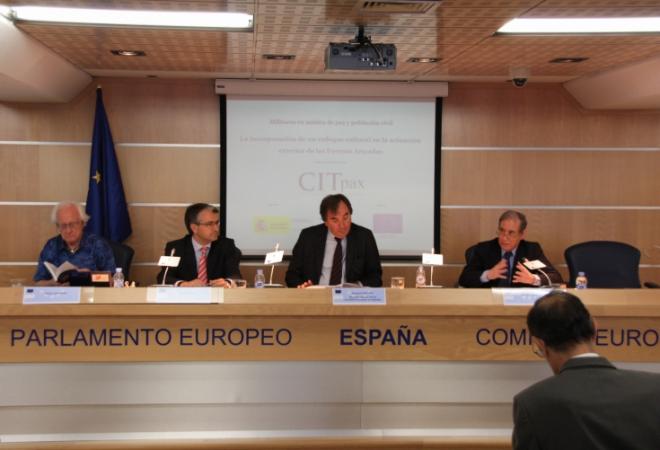Public Event June, 17, 2009

Madrid, European Commission Delegation in Spain
A group of experts in international relations, security and defence affairs, met at the European Commission Permanent Representation in Madrid, to analyse jointly the specific problems arising from the interaction between the militaries and the civilian staff in peacekeeping missions and the civilian population in conflict theatres. Thus the seminar explored how a cultural approach may be introduced or enhanced during the planning and implementation of peacekeeping missions.
This exercise starts off from the evidence that ‘a bad relationship between the international forces and the local population in a given conflict has a negative impact for achieving the mission’s civil and military objectives in the mid and long term’. This poor relationship is partly due to the lack of knowledge about the local culture, its habits and its mentality. Frequently, this lack of awareness contributes to mutual distrust, misunderstandings and unintentional offences.
A bad relationship between the international forces and the local population in a given conflict has a negative impact for achieving the mission’s civil and military objectives
Knowing the culture and the mentality of the peoples that live in a specific region is crucial to understanding how to draw strategies that receive the support of the local population. Ultimately, this will contribute to gain their cooperation for achieving the mission’s objectives.
Furthermore, it is known that cultural awareness of States that send peace missions may also increase the mission’s effectiveness, facilitating its development. At last, as peace building missions develop in the framework of international organisations, it is also important to know their political system, its decision-making culture, its codes, and its written and non written rules.
With this seminar CITpax – facilitated the sharing of experiences in different peacekeeping and reconstruction missions and drew some lessons learned and recommendations on what are considered to be the most frequent problems that the military has to confront as regards to its interaction with the local population, and on what possible solutions have been demonstrated to be most efficient.
The seminar brought Spain’s Defence Culture closer to the general public, explained the work of its Armed and Police Forces abroad, and promoted the inclusion of a cultural approach in the planning and decision making of humanitarian, peace and reconstruction missions as well as its implementation.
See Also
Civil and military cooperation in situations of conflict
Policy Fora February, 10, 2005

